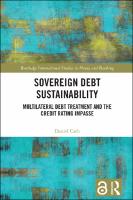Sovereign Debt Sustainability
Proposal review
Multilateral Debt Treatment and the Credit Rating Impasse
| dc.contributor.author | Cash, Daniel | |
| dc.date.accessioned | 2022-11-01T12:58:39Z | |
| dc.date.available | 2022-11-01T12:58:39Z | |
| dc.date.issued | 2023 | |
| dc.identifier | OCN: 1334007415 | |
| dc.identifier.uri | https://library.oapen.org/handle/20.500.12657/59132 | |
| dc.description.abstract | In 2020, the G20 proposed a solution for the debt-related issues affecting the world’s poorest countries due to the COVID-19 pandemic. However, their initiatives have failed to meet their objectives. The author argues that the reason for this failure is the inability to bring sovereign countries to the table to re-negotiate their debt agreements with private creditors as they fear credit rating agencies and the prospect of a downgrade. The author refers to this as the ‘credit rating impasse’. This book proposes a novel solution. The author asserts that there is a need in the literature to unpick the dynamic that exists and creates that impasse, namely the pressures that exist between sovereign states, private creditors, credit rating agencies, and the geo-political backdrop that is massively influential in the dynamic, that is, the adversarial relationship between China and the US. This book addresses the recent history of debt treatment for poorer countries and related successes and failures: COVID-19-related issues and the development of the Debt Service Suspension Initiative and the Common Framework for Debt Treatment. This book examines the reasons for their failure by analysing the positions of the sovereign states, the division between private and official creditors and between multilateral institutions such as the IMF and the World Bank, credit rating agencies, and the competing political entities of China and the US. It presents a wider picture of the systemic underpinnings to such debt-related issues and, when examined through a geo-political perspective, the subsequent chances of future debt treatment-related successes. Licence line: The Open Access version of this book, available at www.taylorfrancis.com, has been made available under a Creative Commons Attribution-Non Commercial-No Derivatives 4.0 license. | en_US |
| dc.language | English | en_US |
| dc.relation.ispartofseries | Routledge International Studies in Money and Banking | en_US |
| dc.subject.classification | thema EDItEUR::K Economics, Finance, Business and Management::KF Finance and accounting::KFF Finance and the finance industry | en_US |
| dc.subject.classification | thema EDItEUR::K Economics, Finance, Business and Management::KC Economics::KCL International economics | en_US |
| dc.subject.classification | thema EDItEUR::K Economics, Finance, Business and Management::KJ Business and Management::KJR Corporate governance: role and responsibilities of boards and directors | en_US |
| dc.subject.classification | thema EDItEUR::K Economics, Finance, Business and Management::KF Finance and accounting::KFF Finance and the finance industry::KFFH Corporate finance | en_US |
| dc.subject.classification | thema EDItEUR::K Economics, Finance, Business and Management::KF Finance and accounting::KFF Finance and the finance industry::KFFK Banking | en_US |
| dc.subject.other | Finance;International economics;Corporate governance: role and responsibilities of boards and directors;Corporate finance;Banking | en_US |
| dc.title | Sovereign Debt Sustainability | en_US |
| dc.title.alternative | Multilateral Debt Treatment and the Credit Rating Impasse | en_US |
| dc.type | book | |
| oapen.identifier.doi | 10.4324/9781003261223 | en_US |
| oapen.relation.isPublishedBy | 7b3c7b10-5b1e-40b3-860e-c6dd5197f0bb | en_US |
| oapen.relation.isFundedBy | Knowledge Unlatched | |
| oapen.relation.isbn | 9781032198651 | en_US |
| oapen.relation.isbn | 9781032198668 | en_US |
| oapen.collection | Knowledge Unlatched (KU) | |
| oapen.imprint | Routledge | en_US |
| oapen.pages | 155 | en_US |
| peerreview.anonymity | Single-anonymised | |
| peerreview.id | bc80075c-96cc-4740-a9f3-a234bc2598f1 | |
| peerreview.open.review | No | |
| peerreview.publish.responsibility | Publisher | |
| peerreview.review.stage | Pre-publication | |
| peerreview.review.type | Proposal | |
| peerreview.reviewer.type | Internal editor | |
| peerreview.reviewer.type | External peer reviewer | |
| peerreview.title | Proposal review | |
| oapen.review.comments | Taylor & Francis open access titles are reviewed as a minimum at proposal stage by at least two external peer reviewers and an internal editor (additional reviews may be sought and additional content reviewed as required). |

